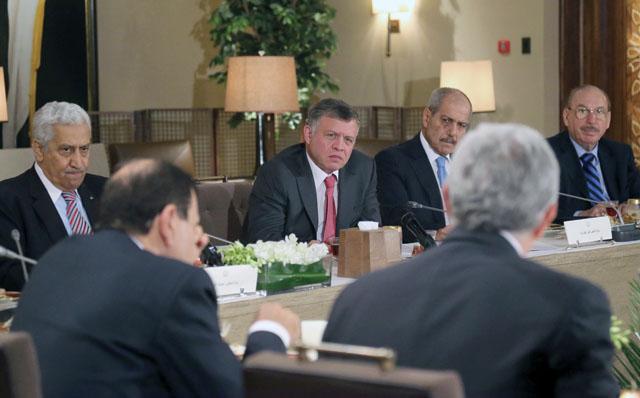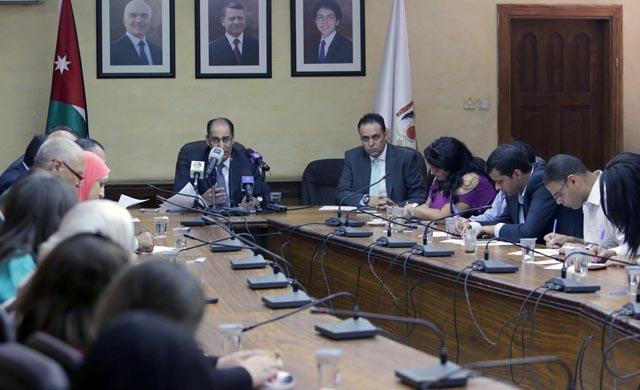You are here
Economic woes key challenge facing Jordan — King
By JT - Aug 21,2014 - Last updated at Aug 21,2014

AMMAN — His Majesty King Abdullah on Thursday urged the private and public sectors to join efforts to define the priorities of the 10-year economic plan he asked the government to draft.
During a meeting with representatives of the various economic sectors at Al Husseiniya Palace, which was attended by Prime Minister Abdullah Ensour, the King said Jordan is currently facing various challenges, mainly those related to the economy and the regional situation.
“Today, we are facing enormous challenges on more than one front, foremost of which are the economic challenges,” the King told the attendees, according to a Royal Court statement.
He noted that regional turmoil has brought about pressures that have heavily weighed on Jordan’s limited resources, adversely affected the private sector and increased the burdens on the Treasury.
During the meeting that was held to hear out various views on the economic plan for the next 10 years, with which the King entrusted the government its preparation in partnership with the various economic entities, the King said economic conditions, with the issues of poverty and unemployment, are the prime concern.
Regarding regional challenges, King Abdullah expressed his confidence in the Jordan Armed Forces, the various security bodies and state institutions and their ability to deal with these challenges, noting that Jordan’s main problem that should be solved is the economic situation.
“… If we can solve the problem of the economy… we will overcome the biggest challenge facing us today, because our problem is not political or a security one, it is about economy.”
The Monarch underlined the issue of the Syrian refugees and the ensuing pressures on the Kingdom, which, he said, are increasing and aggravating the problems of poverty and unemployment, along with other economic difficulties.
“There are Jordanian efforts coordinated with the various stakeholders and world countries to assist the Kingdom in shouldering the burdens resulting from hosting Syrian refugees which have adversely affected the country’s infrastructure and institutional services,” he told the meeting.
The King noted that the crises witnessed in some neighbouring countries affected the volume of foreign trade between the Kingdom and world countries, especially the European countries, urging the government and the private sector to work out alternatives and other ways to boost the country’s exports.
He urged the public and private sectors to cooperate in drawing up the economic priorities and tackle economic challenges through serious, transparent and diligent efforts, adding that he pins high hopes on the economic plan as a means to develop the economy and deal with the challenges at hand, mainly the budget deficit.
Meanwhile, he called on the government and concerned institutions to encourage Arab and foreign businessmen to invest in the Kingdom, highlighting its security and stability, as a plus for the investment environment, in addition to the presence of different investment opportunities.
Despite the challenges, the King emphasised the availability of economic opportunities that should be tapped, stressing the need for speedy efforts to finalise the economic plan, decide on its priorities and revisit relevant legislation, in a manner that eliminates investment obstacles and allows the private sector to have broader opportunities.
Stressing the importance of joint efforts to resolve problems, which he said are clear to everybody, he urged all to carry out their duties.
“We realise that regional turmoil has created a growing refugee crisis, affected main trade routes, closed exporting markets that Jordan has relied on to a large extent, increased energy costs, imposed unprecedented challenges on the Jordanian people, the private sector and the government, and reflected negatively on the living conditions of citizens.”
Expressing optimism about the economy’s future and several countries’ interest in assisting Jordan, he said: “In order for the 10-year plan to succeed… our people have to believe in it first,” reiterating the importance of collective efforts and the need to tap existing opportunities.
The economic sector representatives called for ensuring the stability of laws and regulations, and joining the efforts of the public and private sectors to increase productivity and create more job opportunities.
Laws regulating the economy should be compatible with the 10-year economic blueprint and should take the private sector’s feedback into account, they said.
They also called for more attention to the financial and real estate markets, which have been witnessing a decline in investments, with some local investors choosing to invest in other countries.
The economic blueprint, the participants said, should include measures to support local industries and utilise trade agreements with other countries.
They called for removing red tape and bureaucracy measures hindering investors’ work and uniting the departments dealing with them under one umbrella, adding that small- and medium-sized enterprises should be allowed access to soft loans and microfinance resources.
They also urged the government to ease visa and residence permit procedures for investors.
Responding to the feedback, Ensour said: “We agree on the priorities and objectives, but differ over the means and time to achieve them.”
He outlined the economic laws and regulations completed so far within the Kingdom’s reform drive, noting that the government has managed to restructure public institutions without laying off employees, reducing the size of the public sector to ease the burden on the budget.
The premier said the draft investments law provides a one-stop reference for decisions related to investments.
Under the bill, an investor’s application for permission to invest and receive exemptions is accepted by default if no official answer is given within a specific period, according to Ensour, who highlighted the important role of Parliament in endorsing laws regulating the sector and offering suggestions.
The draft laws on investments and public-private partnerships are currently in Parliament for deliberations, he noted.
Turning to remarks from the private sector on the draft income tax law, Ensour acknowledged that lower taxes are better for the national economy but stressed that Jordan is going through “tough financial conditions” and there are requirements that “must be met under the national reform programme”.
He cited the latest reform measures in expanding the Independent Elections Commission’s jurisdiction through a constitutional amendment, and drafting the laws on political parties, municipalities and decentralisation, adding that a draft elections law will follow.
On plans to address the energy challenges facing the national economy, Ensour said the government has licensed 12 solar and wind energy projects and is constructing the Aqaba liquefied natural gas terminal.
The government is also reconsidering the national power grid’s capacity to take additional loads from renewable energy projects, the premier added, pointing to a joint project with the UAE to generate around 1,000 megawatts from wind and solar energy.
The Basra-Aqaba oil pipeline project is still under way, he added, noting that the security situation in Iraq and the political developments there have had no bearing on it.
At the beginning of the meeting, Planning Minister Ibrahim Saif outlined some of the feedback received from private sector representatives that will be taken into account in preparing the 10-year economic blueprint.
The government, he said, held a series of consultative meetings to listen to different views on the economy and prepare general perceptions that will be presented at a national conference in early September, followed by a closing conference to outline the conclusions reached within the 10-year vision of the economy.
The blueprint will be based on the output of former and current economic studies, plans and strategies to increase the participation of youths and women in the workforce, to reduce the development gap among governorates and enhance productivity and self-reliance.
In an interview with the Jordan News Agency, Petra, President of the Jordan Banks Association Bassem Salem said the discussion with the King revealed that His Majesty is very concerned with the problems of poverty and unemployment, and is keen on the stability of the Kingdom and international support for the country.
He said the private sector has a duty to partner with the government and keep channels of cooperation and coordination open with the public sector to draw up a long-term strategy that addresses all the obstacles facing investments. He lauded the government for its understanding of suggestions made by private sector leaders.
For his part, president of the Jordan Inbound Tour Operators Association Munir Nassar outlined the problems the tourism sector has been struggling with over the past years, telling Petra that he highlighted these problems during the meeting with the King.
He stressed that activating economic laws is vital for the envisioned revival.
President of Jordan Chamber of Commerce Nael Kabariti said that the meeting underlined the need to increase local and foreign investment and activate deals signed with other countries in this field. He called for follow-up meetings to discuss the challenges and demands of each economic sector.
For his part, President of the Jordan Construction Contractors Association Ahmad Tarawneh said that the issue of poverty pockets and the need to encourage vocational training was a highlight in the discussion with King Abdullah.
Senior officials, lawmakers and economists attended the meeting.
Related Articles
Following is the official translation of Prime Minister Abdullah Ensour’s letter to His Majesty King Abdullah on drafting a 10-year economic blueprint.
Minister of Planning and International Cooperation Ibrahim Saif on Tuesday said the government has started to prepare a 10-year economic development plan, as directed by His Majesty King Abdullah.
As a stable country in a rough neighbourhood, Jordan has missed some economic opportunities over the past few years that could have boosted investment inflows and export volumes, according to business leaders.

















